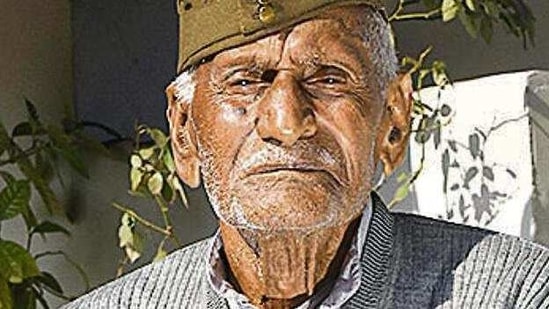‘Our only goal was to ensure that India became free’

By Sadia Akhtar
On a sunny afternoon, as one walks through the quiet lanes of Fazilpur Badli village in Farrukhnagar, a faint yet powerful lilting sound wafts through the air as one approaches the house of freedom fighter Parmanand. Dressed in a pale white kurta-pyjama, the 100-year-old lies on a charpoy in the courtyard of his house reciting fragments of poems from memory.
“Gandhi, Nehru aur Subhas, Azad jo brigade they/ Singapur ke junglomein mein hum roz karte parade they,” recites Parmanand, one of the last surviving members of the Azad Hind Fauj (Indian National Army or INA). He was among the four INA veterans who took part in the Republic Day parade in 2019, and is among the few surviving freedom fighters who took part in the national struggle for independence.
In April 1940, Parmanand, then 20, joined the First Regiment Army in Gurugram. He was sent to Ambala and further to Karachi for training, and then through the ship, the regiment left for Singapore to fight against Japan in the ongoing World War II. In December 1941, the Japanese aircraft attacked the British Army base in Singapore, after which Parmanand and others were taken into captivity.
“We could hear the planes hovering in the air. I quickly went and informed my senior. Following the escalation of the attacks, Japan took British soldiers under captivity,” recalled Parmanand. He and other Prisoners of War (PoW) were told that Japan would help them in fighting against the British for India’s independence. It’s here when Parmanand’s life turned turtle, and from being a loyal solider in the British army, he eventually joined the INA to fight for India’s independence.
Subhas Chandra Bose, who had staged a daring escape from house arrest in Calcutta in 1941 had one aim as the world war raged across the globe, between the Axis powers on one side (Italy, Nazi Germany, Japan) and the Allied powers (Britain and its colonies, later, United States of America) on the other. Rather than support Britain, Bose wanted to use the war to establish a provisional Indian government and a military presence that would fight against the colonial power. Not everyone supported his decision to take help from fascist states like Italy and Germany. However, it was only in 1943 that Bose, who had left Berlin for Tokyo, Japan, proclaimed the establishment of a provisional independent Indian government, and the INA, which comprised several thousand troops trained with Japan’s help.
Parmanand recalled meeting Bose for the first time in 1943. To welcome Bose, he penned a special song that exhorted Churchill to leave India. Over the years, the memory of the lines in the song has dulled, but a little nudge from his family members gives him the incentive to recite it with full gusto. “Paapi Churchill se kehdo, bhaag jaye Hind se [Tell the sinner Churchill to leave India with haste], ” he said.
The trials and tribulations of the INA are recurring themes in his poetry.
“I used to recite poems to motivate my friends and fellow soldiers. Sometimes, they would request for particular poems. I always obliged. Our job was tough and we needed to keep our spirits high among the difficult conditions,” said Parmanand, pausing intermittently to recite another stanza.
“Netaji used to love me a lot. He used to call me affectionately with love, like one reaches out to children. ‘Parmanand, come here!’ he would say and ask me to do chores. ‘Haan ji,’ I would say. He used to give me attention. I, on the other hand, was from a village and not very well-read,” Parmanand said.
“Azad Hind Fauj had four brigades: Nehru, Gandhi, Subhas and Azad. The Bahadur brigade was a microcosm of all the four brigades. It included people from different brigades. I was a havildar in this unit,” Parmanand recalled.
“Our work was very difficult. Even narrating the ordeal of those days sends shivers down my spine. We soldiers were ready to die. Many of us did. We never gave up. We vanquished the Britishers,” he said.
After Singapore, the INA’s next base was Myanmar (then called Burma). For three months, INA fought with British and American armies in Meghalaya, Tripura, Mizoram and entered Assam. “In Kohima, a major battle took place in 1944. In retaliation, the British Army damaged the bridges through which we used to get food grains,” Parmanand said.
The siege of Imphal, or the Battle of Kohima as this confrontation came to be called ended badly for the Axis powers (Japanese forces, and the supportive INA), but Bose’s liberation army succeeded in establishing itself as a scrappy force to reckon with.
During this time, Parmanand was asked to spy on the British base. But he, along with two other soldiers, got arrested. “From the headquarters in Assam, we were sent to some forest area where there were already six prisoners,” said Parmanand, who faced physical torture while imprisoned in Jhikargachha Jail (in present-day Bangladesh).
Six months later, Parmanand was sent to Multan jail. “I was court-martialed for deceiving British government. I was asked about the consequences of cheating British government. I only said, shoot me,” he said.
On February 11, 1946, several months after the Second World War ended with the defeat of the Axis powers and the reported death of Subhas Chandra Bose, Parmanand travelled back home to his village in Farrukhnagar where he told people about the INA and his days of struggle. “When I came back to the village, people asked me questions. They were curious. I told them about the war and our stories. I told them whatever I remembered, stories of our valour and sacrifices,” he said. On returning, he eventually took to farming.
In August 2021, Parmanand will turn 101. In all these years, his commitment to the country has not waned. “Every time, someone asks about my time in the INA, I recall the painful memories that linger for many hours. Azad Hind Fauj sacrificed for the freedom of the country. Our only goal was to ensure that India became a free country. We got imprisoned. If we weren’t caught, we would have killed more and more would have died but we would not have given up,” he said.

“평생 사상가. 웹 광신자. 좀비 중독자. 커뮤니케이터. 창조자. 프리랜서 여행 애호가.”
